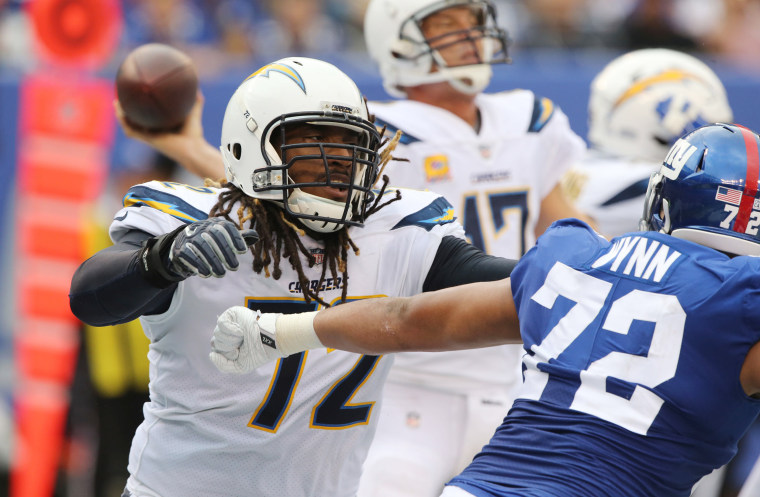Even as he reached the height of professional sports, former NFL player Joe Barksdale always felt something wasn’t quite right.
Why was it so hard to interact with people? Why was it easier to be alone? Why was it so difficult to decipher emotions — his own and those of others?
Many of those questions were answered when he was diagnosed with autism at age 30.
Looking back at his childhood without a diagnosis, Barksdale said kids like him weren’t given the patience and understanding they needed.
“You’re pretty much growing up in a house where people don’t speak the same language and they don’t think the same as you do. You feel like you’re from a different planet,” Barksdale, who is now 33 and lives in Austin, Texas, told TODAY.
“I am very open: I never felt like my parents wanted me and I always felt like if I could become a good football player or good enough at whatever I do, I could prove that I deserve to be on the planet.”

Autism spectrum disorder can be detected in children as young as 18 months old, according to the Centers for Disease Control and Prevention.
The average age at diagnosis around the world is 5, studies have found, but some people aren’t diagnosed until they’re adults. Signs may include difficulty in communicating or socializing with others, and self-stimulating behaviors or “stimming,” such as rocking back and forth, according to the Cleveland Clinic.
The CDC estimates 2% of adults in the U.S., about 5.4 million, are living with autism spectrum disorder.
Barksdale said he’s one of them. After playing football for the Los Angeles Chargers, the Oakland Raiders and the St. Louis Rams, he's now pursuing a career in music and stand-up comedy.
Barksdale and his wife, Brionna, shared their story with TODAY.
What made you get tested for autism?
Joe Barksdale: I didn’t seek out the diagnosis. My therapist had been observing me for years and I guess she had found the right time in one of our sessions to bring up the possibility of me being autistic. She wasn’t the first person to bring it up, though, so I was open to being evaluated and tested. I was looking for things that explain why I had so many difficulties interacting with people.
What kind of difficulties would you have?
Joe Barksdale: I hate talking to people because it seems they always misinterpret anything I’m trying to say, especially when I’m talking about trying to convey emotions. It’s difficult for me to understand people, understand their emotions, and understand myself and my emotions. Most times, it’s easier for me to just be alone.
It’s why I have chosen music and comedy as two career paths. They’re both artistic expressions of how I feel on the inside, and most of the time, it’s the only way that I can effectively communicate with other humans. Even being on stage is its own kind of comforting loneliness because at least you know people are going to listen to you.
Brionna Barksdale: He doesn’t like to be cut off, whereas I think some people understand that might be part of a normal conversation. Joseph is very upfront with how he feels. It was just little things, little nuances like that.
What other behavior did you notice?
Joe Barksdale: Stimming — they’re just repetitive movements that help you deal with difficult emotions. Like bobbing my head back and forth, rubbing my palms with my fingertips, flapping arms, rocking from side to side, not being able to sit still and repetitively petting things that I’m holding.
Brionna Barksdale: The fidgeting. When we go to church, I think that’s the first place I noticed it because it was the first place I sat with him for an extended period of time and he would always have to be doing something during church. But he would also retain the message better than me.
Was I surprised that he was diagnosed with autism? Yes and no. I never said anything about it, but afterwards, looking back, I can say, “Oh, that makes sense in retrospect.”

How were you diagnosed with autism?
Joe Barksdale: There’s an autism specialist in Southern California that my therapist referred me to. There were extensive interviews and also assessment tests in that process. I was diagnosed as high functioning autistic.
How did the diagnosis change things?
Joe Barksdale: It made me more comfortable with who I am. I didn’t change as a person, but it did affect the marriage positively in terms of us learning and knowing more about each other, and going into a deeper relationship.
As a parent, there’s a nervous side of it. Like, am I doing this right? Am I communicating the right way? Does my kid think I’m weird?
Brionna Barksdale: The diagnosis was a bit of a relief. It’s been nice for him to understand why he feels the way he feels. I know it doesn’t make his life easier, but it at least helps to understand why some of the things are the way they are.
He’ll say exactly what he means. So if we’re in a room and he’s like, “Hey, I don’t feel like being bothered” — he just doesn’t feel like being bothered. He doesn’t want to have a conversation about what’s bothering him and why. He just wants to be left alone.
What do you want others to know about navigating life with autism?
Joe Barksdale: I would say having patience and understanding that this person may not think like you and that’s OK.
I would encourage others to seek out a diagnosis. The worst case scenario is it’s a waste of time. The best case scenario is that you learn something new about yourself. Now you know.
This interview was edited and condensed for clarity.

